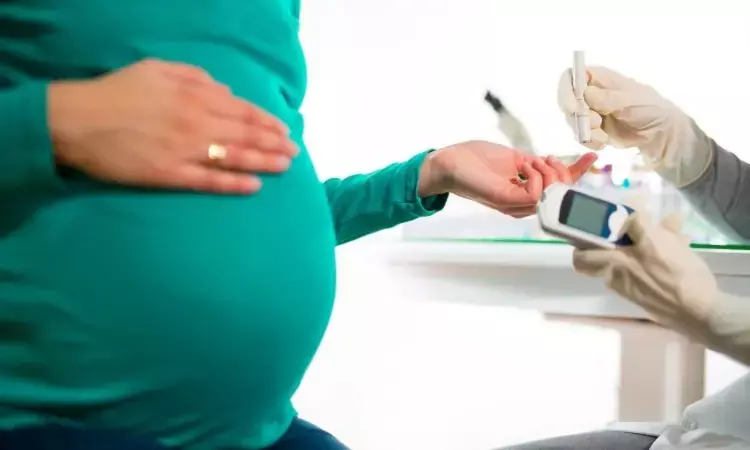- Home
- Medical news & Guidelines
- Anesthesiology
- Cardiology and CTVS
- Critical Care
- Dentistry
- Dermatology
- Diabetes and Endocrinology
- ENT
- Gastroenterology
- Medicine
- Nephrology
- Neurology
- Obstretics-Gynaecology
- Oncology
- Ophthalmology
- Orthopaedics
- Pediatrics-Neonatology
- Psychiatry
- Pulmonology
- Radiology
- Surgery
- Urology
- Laboratory Medicine
- Diet
- Nursing
- Paramedical
- Physiotherapy
- Health news
- Fact Check
- Bone Health Fact Check
- Brain Health Fact Check
- Cancer Related Fact Check
- Child Care Fact Check
- Dental and oral health fact check
- Diabetes and metabolic health fact check
- Diet and Nutrition Fact Check
- Eye and ENT Care Fact Check
- Fitness fact check
- Gut health fact check
- Heart health fact check
- Kidney health fact check
- Medical education fact check
- Men's health fact check
- Respiratory fact check
- Skin and hair care fact check
- Vaccine and Immunization fact check
- Women's health fact check
- AYUSH
- State News
- Andaman and Nicobar Islands
- Andhra Pradesh
- Arunachal Pradesh
- Assam
- Bihar
- Chandigarh
- Chattisgarh
- Dadra and Nagar Haveli
- Daman and Diu
- Delhi
- Goa
- Gujarat
- Haryana
- Himachal Pradesh
- Jammu & Kashmir
- Jharkhand
- Karnataka
- Kerala
- Ladakh
- Lakshadweep
- Madhya Pradesh
- Maharashtra
- Manipur
- Meghalaya
- Mizoram
- Nagaland
- Odisha
- Puducherry
- Punjab
- Rajasthan
- Sikkim
- Tamil Nadu
- Telangana
- Tripura
- Uttar Pradesh
- Uttrakhand
- West Bengal
- Medical Education
- Industry
Pre-pregnancy fasting blood glucose, insulin, and insulin resistance independent predictors of GDM

Australia: Pre-pregnancy insulin, fasting blood glucose (FBG), and insulin resistance may be used as early markers for predicting the incidence of gestational diabetes mellitus (GDM), a recent study has shown. The study was featured online in The Journal of Maternal-Fetal & Neonatal Medicine on 31 Mar 2023.
"The measurement of pre-pregnancy biomarkers might be more beneficial for predicting gestational diabetes than early pregnancy values," the researchers wrote. "Therefore, such analyses should be included in the route health checks before pregnancy to identify women at high GDM risk in subsequent pregnancies."
Gestational diabetes is a state of glucose intolerance detected anytime during pregnancy, which does not meet the criteria for diabetes diagnosis in non-pregnant women. It is a common pregnancy complication, potentially causing short- and long-term adverse health outcomes for the mother and child. Besides, GDM is linked with an increased risk of macrosomia, operative delivery, and hypertensive disorders during pregnancy. It increases postnatal and antenatal expenses. In the long term, it increases the risk of CVDs (cardiovascular diseases) and metabolic disorders in the mother and her baby. Therefore, Early prevention of gestational diabetes is critical to lower the risk of adverse pregnancy outcomes and post-pregnancy cardiometabolic risk in women and children over the life course.
Against the above background, Sura Alwash, The University of Queensland, Brisbane, Australia, and colleagues aimed to determine some blood biomarkers before pregnancy to predict gestational diabetes.
For this purpose, the researchers used the Mater-University of Queensland Study of Pregnancy (MUSP) cohort to investigate the prospective association of blood biomarkers before pregnancy and GDM risk in omen. A multiple logistic regression model estimated the odds of experiencing GDM by blood biomarkers.
The authors reported the following findings:
- Out of 525 women included in this study, GDM prevalence was 7.43%.
- There was an elevated risk of experiencing GDM among women who experienced obesity (Odds ratio = OR 2.4), had high fasting blood glucose (OR = 2.2), high insulin (OR = 1.1), increased insulin resistance (OR = 1.2) and low high-density lipoprotein (OR = 0.2) before pregnancy.
- Adjustments for potential confounders, such as age, marital status, and BMI, did not attenuate these associations substantially.
The findings showed that insulin resistance, insulin, and fasting blood glucose were independent predictions of gestational diabetes. Therefore, the authors suggest that women with insulin resistance and fasting blood glucose before pregnancy should be monitored and paid more attention to GDM prevention.
"Our results suggest that pathophysiological changes related to glucose regulation, which may lead to gestational diabetes, are present before pregnancy and are not simply induced by pregnancy in women who develop GDM," the authors explained.
"Future longitudinal studies must examine the association between these biomarkers before and during pregnancy and GDM," they concluded. "Furthermore, further studies are needed to determine the most appropriate risk-benefit use of pre-pregnancy blood biomarkers."
Reference:
Alwash, Sura, et al. "The Pre-pregnancy Fasting Blood Glucose, Glycated Hemoglobin and Lipid Profiles as Blood Biomarkers for Gestational Diabetes Mellitus: Evidence From a Multigenerational Cohort Study." The Journal of Maternal-fetal & Neonatal Medicine : the Official Journal of the European Association of Perinatal Medicine, the Federation of Asia and Oceania Perinatal Societies, the International Society of Perinatal Obstetricians, vol. 36, no. 1, 2023, p. 2195524.
Dr Kamal Kant Kohli-MBBS, DTCD- a chest specialist with more than 30 years of practice and a flair for writing clinical articles, Dr Kamal Kant Kohli joined Medical Dialogues as a Chief Editor of Medical News. Besides writing articles, as an editor, he proofreads and verifies all the medical content published on Medical Dialogues including those coming from journals, studies,medical conferences,guidelines etc. Email: drkohli@medicaldialogues.in. Contact no. 011-43720751


